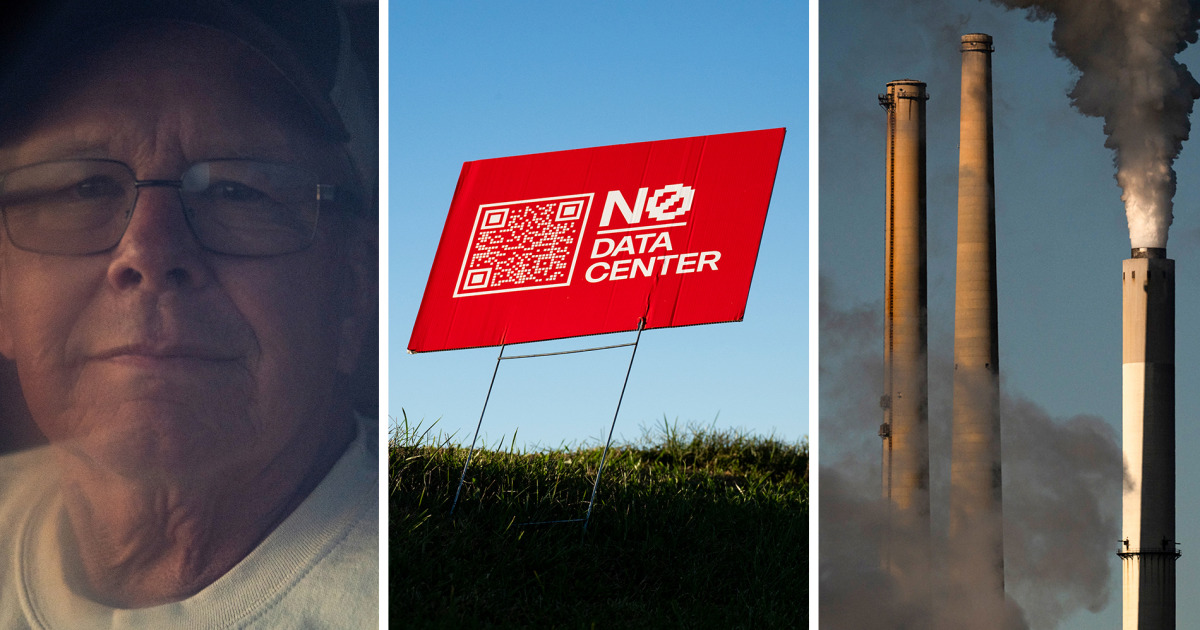The larger tech company backing the project remained undeclared, having used NDAs and registered the proposal through a smaller company, Spark Innovations LLC, which locals believed was a shell company.
Saint Charles Mayor Dan Borgmeyer, bound by an NDA, said that he pleaded with developers for months to let him share details but that they refused, citing concerns about competition.
The backers of Project Cumulus eventually withdrew. In August, Saint Charles became the first city in the country to enact a yearlong ban on data center construction.
Similar bans have been approved and proposed in dozens of counties and townships across the country, including St. Louis, Oldham County in Kentucky and Jerome Township in Ohio.
In Arizona, the secrecy of data center developers backfired.
Pima County officials were bound by an NDA over “Project Blue,” a $3.6 billion proposal put forth byAmazon Web Services, according to a one-page county memo NBC News obtained through a public records request. The project, which would have been built just outside Tucson, was revealed through a leak to the local outlet Arizona Luminaria.
Dr. Matt Heinz, a member of the Pima County Board of Supervisors, said he didn’t even realize he was covered by the agreement until,he said, a developer’s spokesperson called to accuse him of violating it by having spoken to a local newspaper.

“I just have a lot of trouble with the general idea that I, as an elected official representing 200,000-plus people in Pima County, can be held to the parameters of a non-disclosure agreement with a for-profit, private entity,” Heinz said. “That seems like there could be just a natural conflict with what I have to do in service to my constituents.”
Because Pima County officials were bound by the NDA, Tucson city leaders, whose city utilities would have been responsible for supplying the water and power, said they were left in the dark until late in the process.
“The lack of community engagement from the jump led to a lot of distrust,” City Council member Nikki Lee said. “I’ve never seen Tucson as united in opposition to one thing as they were to this project.”
In response to the proposal and the lack of information, residents built their own dashboard to try to quantify Project Blue’s data and water consumption. “We calculated that Project Blue would use more energy than every home in Tucson combined,” said Ed Hendel, whose company Sky Island AI created the dashboard.
After public outcry, the Tucson City Council struck down the project. The Pima County Board of Supervisors also voted to dissolve NDAs 90 days before any county body vote.
Keeping quiet to stay competitive
The data center industry is a fast-moving and fiercely competitive space, where companies view secrecy as essential to protect trade secrets and stay ahead of rivals. Some local officials, caught between company demands and public accountability, said they felt pressured to sign NDAs to keep their communities in the running.
Mason County Attorney John Estill, who signed an NDA for the project proposal, said the county’s leadership would rather not be bound by an NDA but maintained that it’s the only way for elected officials to stay informed about the company’s plans.
“Either you want your government to be courting businesses and looking for development in your communities or you don’t. And if you want them to be courting businesses and looking for growth in your local economies, then unfortunately, NDAs are part of the landscape,” Estill said.
But many residents don’t see it that way.

